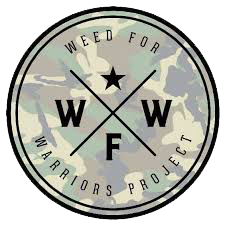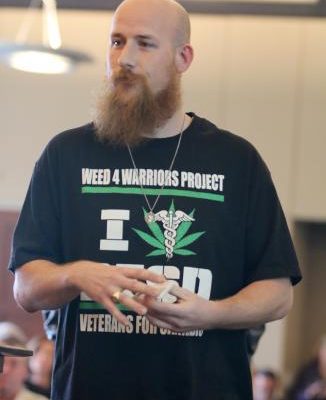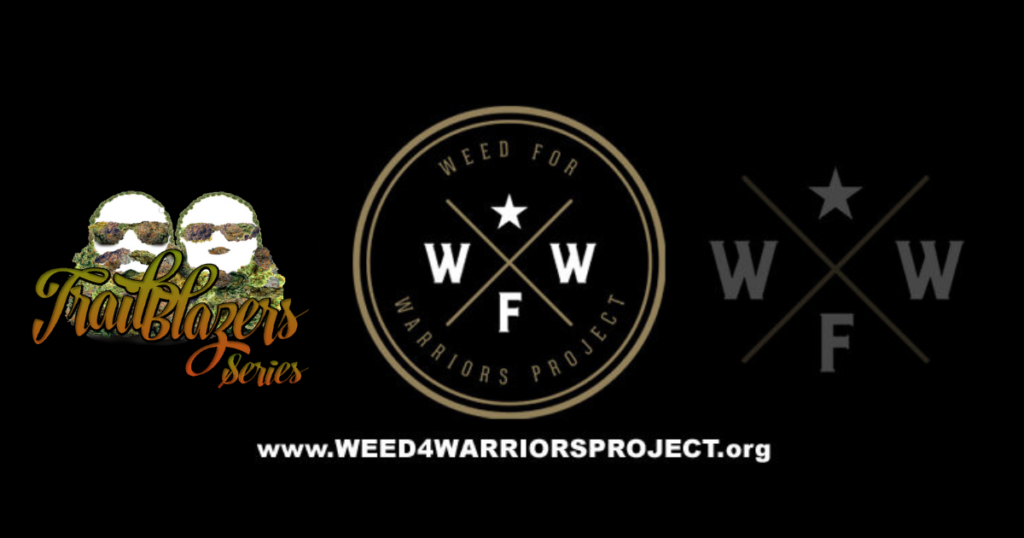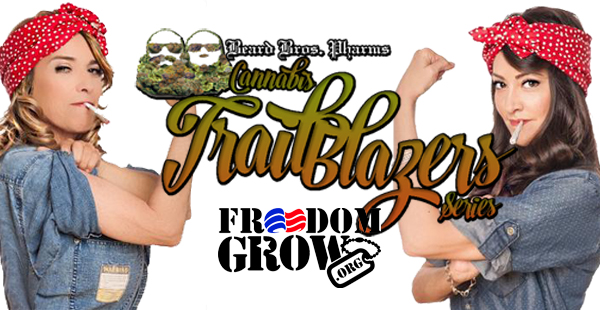
BASIC TRAINING
There are distinct differences in the types of training conducted by the branches of our military, but one thing that they all have in common is that all members of the U.S. military are assigned a status, they form bonds, and they learn to operate in a group setting with virtually everything that they do. When they get out of the military, many are burdened with a crippling sense of loneliness and a lack of direction. Whether it is having a sergeant tell you to drop and give them 20, or if you’re the Sarge and you get to hold that power over others, many vets miss that lack of structure once back in the world. Many avoid crowds and social interaction, fearing that strangers won’t be able to relate to them, or empathize with the lingering issues that can come with military service. But a veteran-founded and operated group by the name of Weed for Warriors is working every day to have a positive impact on the lives of vets, to introduce them to the many benefits of cannabis, and to provide them with the brotherhood and camaraderie that so many of them so dearly miss.
FUBAR
The latest statistics released by the Department of Veteran Affairs reveal that, on average, more than 20 U.S. military veterans and active duty servicemembers are taking their own lives each day across this country. The sad truth is that the number is most likely much higher than that.
The VA relies heavily on state-generated data for its statistics. Those states rely solely on death certificates filled out by coroners to produce that data for the VA. Those death certificates are only as accurate as the information entered into them, and that is where discrepancies occur.
For any number of reasons, the coroner may neglect to note that suicide was the cause of death, or even that the deceased was a veteran. If that vet was homeless and lacked the proper ID, or anyone to vouch for him or her, their suicide could easily be misreported. If a vet or active duty servicemember intentionally overdoses on drugs, it could be ruled accidental. The same goes for automobile fatalities, which account for a measurable amount of suicides each year, but are rarely documented as such.
So the actual number of veterans who take their own lives each day in America is truly unknown. But what we do know is that even one per day is one too many.
The fact is, active duty servicemembers & military vets are more than twice as likely to commit suicide as their civilian counterparts are.
The latest VA report shows that the total is actually 20.6 suicides every day. Broken down further, 16.8 were veterans and 3.8 were active duty servicemembers, guardsmen and reservists. That amounts to 6,132 veterans and 1,387 servicemembers who died by suicide in 2015 alone.
ROLL CALL
Founded in 2014, the Weed for Warriors Project has found a deep well of support from the cannabis community, allowing them to expand rapidly and potentially reach more vets in need.
Currently, the organization is composed of 14 active chapters:

-
Los Angeles, CA
-
Sacramento, CA
-
San Diego, CA
-
San Jose, CA
-
Oakland, CA
-
Fresno, CA
-
Inland Empire, CA
-
Stockton, CA
-
Orange County, CA
-
Las Vegas, NV
-
Tampa, FL
-
Lake City, FL
-
Miami, FL
-
Wisconsin
Chapters meet once per month at very informal and laid back cannabis-friendly WFW events where vets have the opportunity to shoot the shit with fellow vets, without fear of judgement.
The organization is run by vets, all of whom work on a volunteer basis. All money raised goes back into the project to help not only provide some extra cannabis to a vet in need, but perhaps a sympathetic ear or a shoulder to lean on as well.
It may sound trivial, but those who can relate know that just getting vets up and out of their home once a month – giving them something to do – is absolutely saving lives.
Loneliness is a key ingredient for depression.
Depression, mixed with unpredictable psych meds, mixed with God knows what else is a recipe for tragedy, and we are seeing that bear out in these terrible statistics.
FIGHTING BACK
One vet who narrowly escaped becoming one of those statistics is a man named Kevin Richardson.
Kevin is a veteran of the United States Marine Corps where he served until October of 2004. Upon his release, he took his skills as an infantry Marine into the world of government contracting, instructing federal agencies on everything from defensive tactics to ground fighting.
From the outside, it appeared that his transition to civilian life had been a smooth one, and that he was on his way to a fulfilling career.
On the inside, however, Kevin was struggling with mental bouts of PTSD and physical bouts of pain and disability related to his time serving his country.
As the pain in his back intensified, Kevin found himself in the emergency room on more than one occasion. VA officials instructed him that the ER was not a place to come to manage pain and they instead prescribed him a home delivery of 100 Vicodin every month…to start off.
Though effective, the highly addictive pain meds came at a cost. Kevin’s attitude suffered as he felt some sort of “beast inside” that he could not recognize but knew he must suppress.
Though they revel in camaraderie while in the service, many veterans come to enjoy a sense of solitude – be it a hike in the hills or a solo overnight camping trip. But it is important to recognize the difference between solitude and isolation, and Kevin began to wallow in the latter.
Once again, he turned to the VA for help.
Their answer was more prescriptions, this time for dangerous psych meds.
This began what Kevin describes as the worst time of his life, spanning throughout 2013 and into 2014.
On top of the prescription meds, he was self-medicating with alcohol and mixing it all with steroid use… leaving him angry, depressed, and inconsolable most of the time.
Then, one night in April of 2014, Kevin had enough.
Enough of the pain.
Enough of the constant struggle.
Enough of the loneliness.
He began taking any and all prescription pain pills he could find in his home.
In a haze, Kevin noticed his phone ringing and realized it was a call from a fellow Marine that he had met a few months prior at a PTSD101 meeting. He saw that he had already missed a few calls from the same number so he answered.
The man on the other end of the line immediately recognized that something was up with Kevin and asked what was wrong. Kevin admitted that he was “checking out”, but that was not good enough for his comrade who demanded to know his location.
An hour later Kevin was being wheeled into the ER where the doctors would later estimate that he ingested over 75 pills. On top of that, he had guzzled so much alcohol that he blew a 400 on the breathalyzer at the hospital. To put it in perspective, a .08 is considered too drunk to drive.
Doctors pumped Kevin’s stomach as he plead with them to just let him die…
…but he lived.
He spent 4 days in the ICU, but the VA was not done with him just yet. Based on his medical history of a brain injury, PTSD, and now a suicide attempt, he was forced into a mental ward, an experience that he describes as a nightmare.
Once back on the street, the same Marine that had saved Kevin’s life introduced him to medical marijuana. With his extensive experience with opiates, Kevin looked at the 180mg pot cookie in front of him, shrugged, and devoured it whole. He gained a real respect for the power of cannabis that day!
Once he had his own head wrapped around the effects of cannabis, Kevin began to seek out other veterans to share the experience with.
“IT FELT LIKE I DROPPED MY PACK EVERY TIME I SESHED WITH A VET”
By November of 2014, the concept for Weed for Warriors was fresh in Kevin’s mind, but he had no reach on social media yet. That was when he learned of another vet, up in Sacramento, who was on a similar mission.
Mark Carillo is also a Marine Corps vet, having served between 2003 and 2007 on two “humps” to Fallujah, Iraq.
 Mark Carillo, COO of the Weed for Warriors Project & founder of the Sacramento Chapter
Mark Carillo, COO of the Weed for Warriors Project & founder of the Sacramento Chapter
Upon his release back into the civilian world at the end of ’07, Mark slipped into a 5th of vodka per day drinking habit that would nearly swallow him whole for the next two years.
In 2009, Mark recognized that he was on a bad path with the booze and he turned to cannabis as an alternative. In 2010, he began growing his own and soon found himself with a recurring surplus of dank buds after each successful harvest.
He linked up with a local dispensary in Sacramento where he would verify proof of service with any of their members who qualified, and he’d gift them bags of weed to free up their budgets for other necessities.
It was around that time that he crossed paths with Kevin, who was looking to form a unified effort to benefit fellow veterans. Mark was hesitant at first, as many vets are, to put his full trust in a stranger. But he saw that Kevin was taking the movement to a national scale and he knew that he wanted to be a part of the effort.
PHASE I – AWARENESS
Inspired, Kevin created the Weed for Warriors website (www.wfwproject.org) and Instagram account (@wfw_project) and the organization immediately began having a real impact on the cannabis community.
With a little bit of money in his pocket, and some art instruction from college, Kevin self-funded the early days of Weed for Warriors, designing and purchasing hundreds of t-shirts, flyers, banners and more to help to get the word out about what they were trying to do.
Before they knew it, the panels that they were speaking on at cannabis events were held in front of standing room only crowds.
Looking back on those early days, Kevin says, “I saw a need for veterans to start standing up in our communities and to band together because together we can make a difference.”
But, in hindsight, he also realizes that by diving so deeply into Weed for Warriors so soon after his own suicide attempt, he never gave himself the time to properly process those emotions and begin to heal.
Because of this, Kevin fell into a mental relapse of sorts. He saw people in the cannabis community that were willing to take advantage of vets for their own gain, and he saw fellow vets insincerely using their service to gain advantage within the cannabis community. This burnt Kevin out quickly and he was forced to take a step back from his daily duties with the project for his own wellbeing.
SHARE THE PAIN, SPREAD THE JOY
“I didn’t get into this for any other reason than to help vets,” says Kevin, adding, “I didn’t want anything to set a wedge in front of what I set out to do which was to bring vets together. If you ask any military veteran what is the one thing that they miss the most about the military, they’ll tell you it’s the camaraderie.”
In times of war, soldiers in the armed forces are given breaks away from duty, traditionally referred to as R&R, or rest and relaxation, so that they can physically, and more importantly mentally, recover from battle.
What many people don’t realize is that our veterans are still waging a battle every single day, and too many of them are losing.
When Kevin took his own R&R, his brothers in arms were there to step up and Charlie Mike, or continue the mission for Weed for Warriors.
Mark in Sacramento took over on the operations side of things, laying the groundwork for the expansion of chapters that the group continues to benefit from.
To handle the business strategy and political side of the project, the group elevated Sean Kiernan, an Army Airborne vet who served from 1989-1993 to the title of CEO, but Kevin, Mark, and Sean admit that they do not put a lot of weight in titles, it’s more just a way of delegating duties.
“In the military they tell you that if you go down, the guy on your left and your right will go down too and so that bond is what keeps me fighting,” says Kevin. “To give these vets a place to come and decompress, and joke, and cry, and hug each other… it’s overwhelming.”
Weed for Warriors chapter meetings have few rules, but there is some structure to ensure that they provide a safe and welcoming environment for everyone from the salty old vets to the more introverted within the ranks.
Attendees are instructed to bring a valid state medical marijuana rec and proof of service. There is no alcohol at these events but there is plenty of weed! Kevin readily admits that cannabis is a gateway drug, “A gateway to float tank therapy, a gateway to meditation, and to yoga, and to getting outdoors, to creating art. It was a gateway to so many doors that I had shut before I found cannabis.”
For Kevin, and for so many vets like him, there are still dark days that must be overcome.
Trying to do so alone becomes a literal death sentence for some of the strongest, bravest, most honorable men and women in our society.
“If I didn’t have that friend that I met in that group,” Kevin says, “I wouldn’t be here today.”
That is what Weed for Warriors is all about.
Kevin, Mark, and Sean all show enormous gratitude for the cannabis community in general.
The esprit de corps in the Weed for Warriors Project is stronger than ever and that is due in large part to contributions from folks like you and us!
“I can’t wait to see what the Weed for Warriors Project and Beard Bros. can do in the future to continue to push the movement,” says Mark.
Sir, yes sir. We attended the very first LA Chapter meeting for the group and we vow to continue to donate to their cause and help to spread their message.
You can help by hitting up their website and making a donation, and by helping to spread their message though your social media network whenever possible.
It’s truly that easy to save a life.

1 brave veteran took their own life while you read this article – we’ve got work to do…
Be sure to read our other Cannabis Trailblazers profiles where we take an in-depth look at the people and organizations that make us proud to be associated with cannabis
The Cannabis Trail Blazer Series: An Inside Look at the Hope Dealers at Freedom Grow
Keep updated on all the latest news and updates in the Cannabis industry here at Beard Bros Pharms by signing for our Friday Sesh Newsletter here. Always Dank and Never Spam!


















